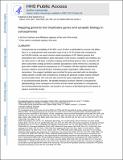Mapping genomic loci implicates genes and synaptic biology in schizophrenia
Author(s)
Feng, Guoping
DownloadAccepted version (2.401Mb)
Open Access Policy
Open Access Policy
Creative Commons Attribution-Noncommercial-Share Alike
Terms of use
Metadata
Show full item recordAbstract
Schizophrenia has a heritability of 60-80%1, much of which is attributable to common risk alleles. Here, in a two-stage genome-wide association study of up to 76,755 individuals with schizophrenia and 243,649 control individuals, we report common variant associations at 287 distinct genomic loci. Associations were concentrated in genes that are expressed in excitatory and inhibitory neurons of the central nervous system, but not in other tissues or cell types. Using fine-mapping and functional genomic data, we identify 120 genes (106 protein-coding) that are likely to underpin associations at some of these loci, including 16 genes with credible causal non-synonymous or untranslated region variation. We also implicate fundamental processes related to neuronal function, including synaptic organization, differentiation and transmission. Fine-mapped candidates were enriched for genes associated with rare disruptive coding variants in people with schizophrenia, including the glutamate receptor subunit GRIN2A and transcription factor SP4, and were also enriched for genes implicated by such variants in neurodevelopmental disorders. We identify biological processes relevant to schizophrenia pathophysiology; show convergence of common and rare variant associations in schizophrenia and neurodevelopmental disorders; and provide a resource of prioritized genes and variants to advance mechanistic studies.
Date issued
2022Department
Massachusetts Institute of Technology. Department of Brain and Cognitive SciencesJournal
Nature
Publisher
Springer Science and Business Media LLC
Citation
Feng, Guoping. 2022. "Mapping genomic loci implicates genes and synaptic biology in schizophrenia." Nature, 604 (7906).
Version: Author's final manuscript